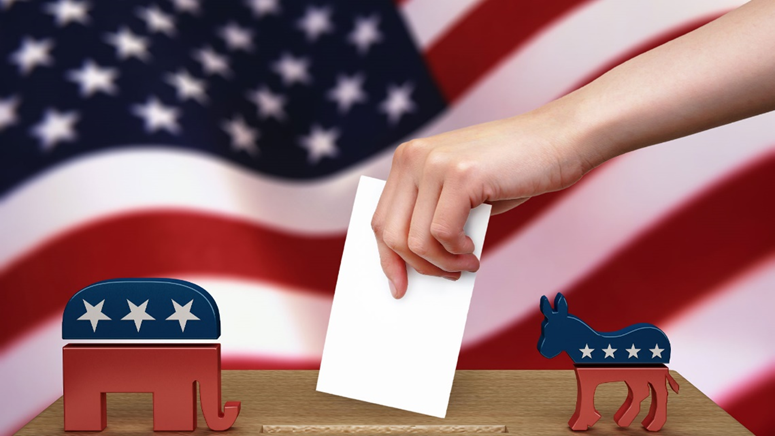The US has declared itself to be the global leader in democracy through its mass media, powerful economy and extensive military. However, the US needs many reforms before it can claim to be truly democratic. Disposing of the two-party system would be a good place to start.
 |
Hand with ballot and wooden box on Flag of USA, party icon ©
Peeradach R / shutterstock.com |
Despite its domineering international presence and resolute
claim to democracy, the US has never been truly democratic. While the Western
superpower does have some features of democracy, many authoritarian regimes,
such as Russia,
Egypt
and Azerbaijan
have democratic features as well.
In my previous article,
I evaluated the ways in which the rich have US politicians under their thumbs,
and how the American two-party system—which George Washington famously warned
would become problematic—is more corrupt than ever before.
A
Two-Horse Race
The mere fact that these two political parties enjoy many
perks and privileges undermines democratic ideals. Democracy requires all
parties to be treated equally. Democratic and Republican parties are funded
generously by public, government, government political action committees
(PACs), labor unions, corporations, and other associations. Other political
parties, such as the Libertarian, Green, Reform, Constitution and Natural Law
parties all struggle for recognition. These less powerful parties face many obstacles,
including lack of attention by the media, minimal federal campaign financing,
and a shortage in government funding.
Oftentimes, US elected officials dishonor their commitments
and promises to their constituents, which has led to voter
apathy. The presidential elections draw the most voters to the polls, but
still fall short of obtaining popular eligible voter participation. From
1904-2016, voter
turnouts have varied from 66% to less than 50%. Midterm turnouts are
substantially worse. In 2022, the voter turnout was less than 46%
in Texas, despite the mail ballot option. Apparently, many Americans are
unhappy with the two-party political system and feel that their votes do not
amount to anything. The US public is waking up to the realities of its
corrupted government. According to a 2022 Pew survey,
only 32% of American adults feel that the two primary political parties
adequately align with their views. That means that an overwhelming majority of
Americans are not happy with the current government and election process. To
become democratic, the US political system must reform.
In a truly representative
democracy, the people’s elected officials should be obligated to consider
their constituents’ ideas, interests, concerns and welfare in rendering
political decisions. In the US, the situation is totally different. Americans’
choices are chiefly limited to the candidates from two political parties who,
at least superficially, represent completely opposite views. Many American
voters are frustrated that there is no middle ground. To make matters worse,
the champions of these polarizing elections are then indebted to the rich who
funded their campaigns, rather than to the constituents they were elected to
represent.
Hostility,
Not Rivalry, Between the Parties
From the start, the two-party system was condemned at the
highest level. “The alternate domination of one faction over another…is itself
a frightful despotism,” warned the first US president, George Washington.
The French philosopher Voltaire
held a similar view, stating that “If one religion only were allowed in
England, the Government would very possibly become arbitrary; if there were but
two, the people would cut one another’s throats; but as there are such a
multitude, they all live happy and in peace”.
The same is true concerning a regime with two political
parties. This limiting of political debate to a binary opposition encourages
extremism from both sides and leads to the dangerous polarization of the
public. In recent decades, tensions and violence have risen across the country.
Both parties continue to adopt harmful tactics in an attempt to cut the other
down and gain supremacy. The American public suffers as a result. As observed
during the January
6 insurrection, when thousands of angry constituents stormed the capitol
building in Washington, DC, the incessant bickering between the Democrats and
Republicans has fragmented the nation and heightened the risk of dissolving the
union.
The recent election
of the US House speaker is a perfect example of the conflict and corruption
that plagues the current government. It is an event that will go down in
history as one of the most notorious examples of the inefficiency of American
politics — a direct result of a system confined to only two polarizing political parties.
It took 15 rounds of voting to elect Republican Kevin
McCarthy speaker of the House of Representatives. In a very contentious
election, McCarthy won with less than half of the House participation. Many
officials abstained from the vote, including six of McCarthy’s fellow members
of the Republican party. He was finally elected thanks to his endorsing the
concession that any member of the House could call for his removal at any time.
This was similar to what happened during the House election in 1859 before the
Civil War. The event demonstrated the deep dysfunctionality of the two
political parties in the US Congress. Their continuous bickering makes it
impossible to pass meaningful bills in a timely manner. However, these
competitors are united in their habit of catering to megadonors in the support
of the military-industrial complex, despite the fact that president Dwight
Eisenhower warned against it in his 1961 farewell speech.
As seen in the election of McCarthy as House speaker, America
is run by two squabbling political parties. These politicians are more focused
on shaming one another than addressing the overwhelming national problems that
plague the country.
It is not surprising that the nation is divided, and so many
Americans are living every day in desperation and anger. Economic disparity and
discrimination are national issues which are particularly oppressive to
minority groups including Native Americans, blacks, Latinos, and Muslims. The
gap between the rich and the poor is deep and ever-widening. Approximately 32%
of all wealth
in the US is held by only 1% of the population, an alarmingly disproportionate
statistic. Even more concerning is that at the same time, over 11% of Americans
live below poverty
level. American politicians have not done nearly enough to address these
issues.
The two-party animosity of the federal government has
spilled over into the states. State level politicians often engage in a
manipulative practice called “gerrymandering”, a
redistricting scheme that intentionally marginalizes minorities, the poor and
the least-educated citizens.
This endless bipartisan frustration leads to hostility
between citizens, families, and friends. A poll
conducted by the Pew
Research Center found that “72% of Republicans and 64% of Democrats” consider
the other party to be more dishonest.
While many Americans abhor the two-party system, some fear
that having more than two parties could result in a coalition, making the
country even more unstable than it already is. However, this fear is
unsubstantiated. Many Americans will continue voting as their parents had, and
will remain loyal to one of the two major political parties that currently
dominate. Furthermore, competition will force the Republican and Democratic
parties to become more centrist in their policies, as extremism will no longer
be advantageous. Investing in lesser-known political parties would benefit the
US immensely. If this is not accomplished soon, the US is at risk for the first
ever global social progress recession.
Crisis
Demands Reforms
Most of the US’ infrastructure
was built after World War II, and is rapidly deteriorating. The American
Society of Civil Engineers (ASCE) rates US infrastructure near failing with D+
grade. Across the country, highways, bridges, tunnels, railways, clean water,
electricity and other public services are either in complete ruin or are
insufficient to accommodate population growth. Despite this undeniable
infrastructure crisis, US politicians continue to overspend on the military.
In 2021, the US military spent a whopping $801
billion while its top adversaries, China, Russia and Iran, spent $293
billion, $65.9 billion, and $24.6 billion respectively. Thus, the US spent more
than double on its military than the combined spendings of its global
competitors.
To break it down, US military spending was around three
times higher than China’s, over 12 times more than Russia’s and 32 times more
than Iran’s. This unnecessary spending could have been better spent to help the
poor, increase domestic production, and improve America’s dilapidated
infrastructure.
Without standards in place to ensure equal opportunity and
constitutional rights for all American citizens, democracy can easily be
transformed into what John Adams called, “the tyranny of the
majority.” Thomas Jefferson also purportedly claimed that democracy can often
resemble mob rule, and in the case of America’s current political sphere, this
saying has a ring of truth.
The biased and corrupt two-party system is not sustainable
long-term. It is time to challenge the power of bipartisanism. To begin, I
recommend the following steps:
1. First, provide sufficient funding to less extreme political parties, to allow them to finally break through onto the political stage and permit them to have actual influence on elections.
Second, cut all federal campaign financing and government
funding. When the government has such a powerful monetary hand in elections,
corruption is inevitable.
Third, provide free “equal
air time” in broadcasting for all election candidates, not just the ones
who can shell out the most money. Many quality candidates become overshadowed
by wealthy extremists who can afford to disseminate more political advertising
and propaganda.
Fourth, limit contributions from all sources to that which
is equal to what the average American is willing to contribute to a candidate.
PACs, unions and other associations can multiply that amount by the number of
their active members. However, no member should be allowed to double-dip,
individually or as a group.
Fifth, dismantle the “winner-take-all” electoral
system, which has been rejected by many emerging democracies. Nebraska and
Maine have already vowed to dismantle this system and allocate
results proportionately instead.
Sixth, enforce the “Code of
Official Conduct” in both government chambers. Insert a paragraph to ensure
that members of Congress, their family members, close friends, and associates
are unable to practice nepotism to accumulate wealth and power, or be favored
for high political positions.
Only when the United States takes steps to implement these
changes will the nation begin its ascension to true democracy.
By
This article was originally published by Fair
Observer.













